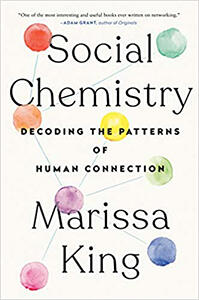How Finding a Mentor—or Even Better, a Sponsor—Can Accelerate Your Career
In an excerpt from her book Social Chemistry: Decoding the Patterns of Human Connection, Prof. Marissa King explains how a more experienced colleague can help propel your career. A mentor who provides support and guidance is valuable; a sponsor who advocates for you is harder to find but even more effective in helping you advance.

Consider for a moment the person who has most profoundly impacted your career. Take a moment to thank them. Whether you’d call that person a mentor, sponsor, or something else entirely, the more significant a presence he or she has had in your life, the more successful you are likely to be. To succeed at work, you need someone to advocate for you, put your name in the hat for stretch assignments, and make introductions. Sometimes the person is a friend, but sometimes he or she isn’t.

The vast majority of men and women—76% and 83%, respectively—report having at least one mentor during their careers. The relationship between mentors and protégés differs from other types of relationships, such as friendships, supervisor/employee, or therapist/patient, though it combines elements of all of them. Mentors are role models with more experience than protégés. They provide guidance, emotional support, and an opportunity for self-reflection and development. As Simmons College professor Stacy Blake-Beard put it, mentorship is a “dynamic, reciprocal relationship that is mutually beneficial, empowering, and enabling.”
Like most social relationships, mentor-protégé relationships usually form along lines of surface-level similarities. Mentors and protégés look alike. This disadvantages women and people of color, since post-MBA protégés make roughly $28,000 more if they are mentored by a white man. As Sylvia Ann Hewlett and her collaborators wrote in the Harvard Business Review, because cross-gender relationships “can be misconstrued as sexual interest, highly qualified women and highly placed men avoid” them. In the wake of recent waves of sexual harassment charges, the number of men who report being uncomfortable mentoring or sponsoring women has tripled.
Recruiters often tout mentorship programs in which people are paired with a mentor of the same sex, race, or sexual preference. But mentoring relationships based on deeper similarities—beliefs, values, and experience—have better outcomes.
But research consistently finds that the best mentoring, like many of the best relationships, occurs when there is some similarity and some difference. A study of more than 220 pairs of doctoral students and their advisers found that approximately two-thirds of protégés had a mentor of the same sex. In the short term, when a doctoral student had a same-sex adviser, they received more emotional support, assistance, visibility, and sponsorship. However, as time went on, the relationships stagnated. They didn’t get better or worse, just stayed the same. But for opposite-sex mentorships, there was a marked improvement over time. Once mentors and mentees got past the difficulties of working with someone who was different, those differences actually made for a better relationship.
Mentoring relationships based on deeper similarities—beliefs, values, and experience—have better outcomes. For instance, a study that examined how much psychological support and satisfaction was provided by mentors found that relationships based on deeper similarities provided far more emotional and instrumental support than relationships in which partners were simply of the same sex or race.
We gravitate toward people who are similar to us, though we are most likely to benefit from difference.
Mentorship can help create more productive and advantageous relationships at work by providing access to people with power and influence, developing the social skills of the protégé, creating opportunities to form new ties, and acting as an endorsement and signal of respect. It is one of the most effective relationship interventions companies have at their disposal. While trying to force workplace friendships isn’t advisable, even if it is possible, assigning mentors is. Yet many companies still insist on assigning mentors along demographic lines. Recruiters often tout mentorship programs for women and other minorities in which people are paired with a mentor of the same sex, same race, or same sexual preference.
A formal program could help obviate some of the endemic problems of networks built on self-similarity. However, despite the potential benefits of formal network interventions, 82% of women and 84% of men found their work mentors informally through their own networks.
A study by Sameer Srivastava, a professor at the University of California, Berkeley, compared the career outcomes of employees with high potential in a software development laboratory who were randomly assigned a mentor to the careers of similar employees in a matched control group. Employees who were randomly assigned a mentor gained greater access to people in power and developed a broader network as a result of participating in the mentorship program. Similarly, Forrest Briscoe at Penn State and Katherine Kellogg at MIT found that lawyers who were randomly assigned to a powerful supervisor when entering a firm had bonuses that were on average $30,000 higher and were 18% less likely to quit than associates who spent no time with powerful supervisors when they joined the organization.
In a separate study of MBA alumni from across the globe, Herminia Ibarra of London Business School and her colleagues compared the effect of formal and informal mentors on career success. Women who connected with a mentor through a formal program received 50% more promotions than women who found their mentor informally. The same isn’t true for men. They are more likely than women to find powerful mentors who can advance their careers through their informal ties, so they may be less likely to benefit from formal assignment.
“Intentionality on both sides really matters,” according to W. Brad Johnson, a professor at the U.S. Naval Academy and author of several books on mentoring. “If there is one variable that shows if mentorship relationships are likely to take off or not, it’s frequency of interaction during the first several months of the relationship.”
While many people can fondly recall a mentor who provided guidance and emotional support, there is a relationship that is far rarer but much more important for career advancement: sponsorship. One in five men have a sponsor. One in eight women do.
Sponsors differ from mentors in that they advocate for the sponsee, make social connections, and use their own social capital on behalf of the sponsee. The former chief diversity officer at GE, Deborah Elam, said the distinction between sponsors and mentors lies in the fact that a sponsor will “put their name next to your performance.” While both mentors and sponsors often provide emotional and instrumental support, mentors are closer to friends. Sponsors are advocates and investors. Their support is public and they use their reputation to support yours.
Sponsorship is one of the strongest predictors of promotions and salaries—roughly equivalent to the number of hours someone works—according to a study that examined the careers of tens of thousands of employees and dozens of predictors of job success. For promotion prospects, sponsorship matters more than someone’s gender, personality, education, and experience.
The same was true for career satisfaction. Career success is as much a game of getting a sponsor as it is one of performing well.
Unlike mentors, sponsors are difficult (if not impossible) to assign. Given the nature of the relationship, sponsorship has to be earned.
Unlike mentors, sponsors are difficult (if not impossible) to assign. Given the nature of the relationship, sponsorship has to be earned. When asked what it took to build relationships with three great sponsors, Sian McIntyre, the managing director of advocacy and customer experience at Barclays, put it succinctly: “I’ve delivered.”
Stretch assignments in which you have the opportunity to showcase your skills can be helpful if you are looking for a sponsor. Other options are volunteering to take on roles and tasks that give you exposure to people you might not otherwise come across—organizing panels, writing special reports, or participating in programs to onboard new employees. However, performance and loyalty may not be enough to earn sponsorship, according to Hewlett. You need to be able to differentiate yourself from peers.
We need sponsors at work and we often need mentors in life. Work isn’t all there is to life, and in life—just as at work—we often need help to get by and realize our full human potential.